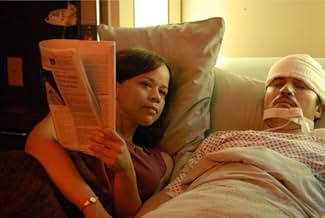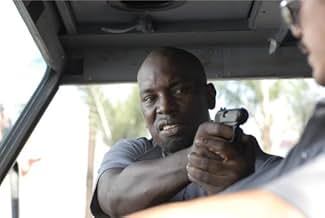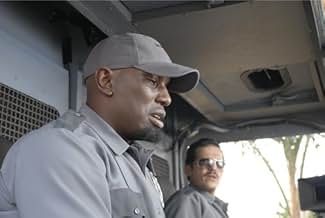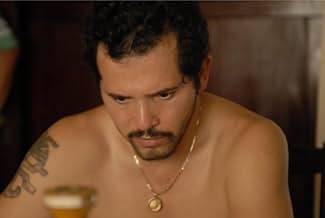IMDb रेटिंग
5.8/10
2.5 हज़ार
आपकी रेटिंग
अपनी भाषा में प्लॉट जोड़ेंAfter he's shot during a heist in East L.A., an armored truck driver wrestles with rehabilitation and tracking down the man who committed the crime.After he's shot during a heist in East L.A., an armored truck driver wrestles with rehabilitation and tracking down the man who committed the crime.After he's shot during a heist in East L.A., an armored truck driver wrestles with rehabilitation and tracking down the man who committed the crime.
- पुरस्कार
- कुल 1 नामांकन
Jessica Steinbaum
- Rosey De La Pena
- (as Jessica Steinbaum-Lopez)
Taylor Gray
- Javy De La Pena
- (as Taylor Arthur Gray)
फ़ीचर्ड समीक्षाएं
The Take isn't one of those films you'll remember forever, it's plot simplistic, and script not without some flaws, but you will definitely remember the performances by the entire cast.
I always defended Leguizamo as a serious actor, while some claim he's always typecast. I knew he was talented, and he immediately sets the tension in this film. He does a great job in every scene. Rosie Perez was also intense, nice to see her always. Lequizamo drives the film, he's clearly not just a supporting actor. He deserves to be A-listed.
Another honorable mention is the directing of the film. I loved the Urban cinematography! East LA was never covered better. The old fashioned town is shown well, and gritty atmosphere adds to the already dark tale.
Overall, a good old school revenge tale, a modern western perhaps! 7/10
I always defended Leguizamo as a serious actor, while some claim he's always typecast. I knew he was talented, and he immediately sets the tension in this film. He does a great job in every scene. Rosie Perez was also intense, nice to see her always. Lequizamo drives the film, he's clearly not just a supporting actor. He deserves to be A-listed.
Another honorable mention is the directing of the film. I loved the Urban cinematography! East LA was never covered better. The old fashioned town is shown well, and gritty atmosphere adds to the already dark tale.
Overall, a good old school revenge tale, a modern western perhaps! 7/10
There is a time and a place for shaky, hand-held camera work. This irritating technique continues to be the most over-used in Hollywood. I nearly turned this film off after the first 4 minutes because I was experiencing motion sickness. And this was all while the protagonist was getting up and getting ready for work. Even when you are trying to show action as it might be seen from a live news camera I would still make a case for trying to show the action as it might be seen by the human eye -- steady and focused even when the viewer is moving. My perception is that shaky camera work is used in the same way that too much background music is used -- to compensate for mediocrity in the film itself.
I stayed with the film to the end because a lot of others felt it was a good film and John Leguizamo can be counted on for a fine performance. I thought the movie itself was only OK. Story line developed slowly and often tediously to a somewhat satisfying conclusion. I would have rated it a 5 to 6 with better camera work. I'm glad I saw the whole thing but I will never need to see it again.
I stayed with the film to the end because a lot of others felt it was a good film and John Leguizamo can be counted on for a fine performance. I thought the movie itself was only OK. Story line developed slowly and often tediously to a somewhat satisfying conclusion. I would have rated it a 5 to 6 with better camera work. I'm glad I saw the whole thing but I will never need to see it again.
Drawing on clear influences from recent gritty, crime infused pieces such as 2000's Traffic and 2002's Narc, 2008 film The Take seems to have come and gone at a Canadian film festival before being banished to stores so as to increase profits on DVDs. It would seem there was nary a distributer at said Canadian festival willing to invest in Brad Furman's film; an overall shame, not a crying one but a shame none-the-less. The Take squeezes an amount of substance to do with male machismo; the tearing apart of a family unit; the sub-genre of the vigilante movie and the dealing of the aftermath of a heist plus all the crime drama conventions of mistrust between gangsters: honour amongst thieves, if you will, into 96 minutes. However, all too often these ideas jostle uncomfortably with one another – a persistent vying for power, a struggle between genres and sub-genres; content and study. This renders The Take less interesting than it might have been, but good enough to see in order to observe a moderately interesting, well acted independent American drama.
I think the film thinks it's more powerful and more affecting than it is in actualité. The tale is of a righteous man wronged, and the subsequent fall out it has on both his life and the lives of those around him. But for all the substance, for all the promise and for all the content; to have The Take boil down to a chase sequence on foot that, again, certainly thinks it has more of a sense of drama involved than it actually does, was just a mite disappointing and anti-climatic. Furman likes his visual tricks and gimmicks, with someone somewhere failing to realise that spectacle and visualness ought to have been secondary to this screenplay's agenda as gritty, Hispanic-American living conditions; seams in a family becoming unravelled; a man loosing his mind and sense of masculinity plus brutal shootings during a heist sequence were the order of the day. Furman tells the story with every trick in the book: the visual flair ingredient to the editing and camera work; the speeding up of footage; transitions and the hand-held camera technique on top of a number of scenes set in rooms that are close to all being entirely blacked out for sake of mood.
John Leguizamo plays the role of Felix De La Pena, a man of Hispanic descent living with his wife Marina (Perez) and their two kids in Los Angeles. De La Pena is a nice, upstanding man with a great deal of fondness for his family and the work he does. His large friend-base plus the fact his job sees him adopt a certain role of honour and trust in driving an armoured truck instills a sense of responsibility on top of the other positive conventions. But one day, things go spectacularly wrong when Tyrese Gibson's criminal Adell holds up the truck; has De La Pena drive it back to the HQ before robbing the place of its money and fatally wounding De La Pena. We've seen people shot following heists in films many-a time before, usually hard-bodied; no nonsense criminals in hard boiled neo-noirs, but they'd always get back up again after a brief lay off and plough on ahead, seeking money and revenge. The Take's sequence of wounding feels grainer than usual, De La Pena's pained reaction to his injuries are stark and cutting in ways that I've rarely felt a gunshot wound in a film before. The injury feels more painful than usual because of the film's delicate buildup of the victim: a well mannered; rather slim, though not necessarily 'weak', and supremely upstanding character in De La Pena. From here, a process of recovery for both the mind, body and soul begins as FBI agent Steve Perelli (Cannavale) hunts the wrong-doers.
It's here the film beds down for a long stretch of content similar to one another. De La Pena's sense of self vanishes and he gets a lot angrier a lot more often than usual, with Leguizamo really rather brilliantly portraying this new character: this fresher, more frothing at the mouth person. He installs security equipment in a fit of paranoia and undergoes a process of long recovery that sees him sense a once-present notion of 'manliness' now gone. Subsequently, he cannot make love to his wife; gets agitated as a result and seems to maintain this odd sense of being unable to really 'feel', as if to cry or get upset at the shooting is to fatally expel a sense of male machismo, with an ideology that might read something like: 'men don't cry - men get over this sort of thing'.
I wrote a while ago in an observation on a Finnish film from 2006 entitled Lights in the Dusk about the film's over-emphasising on the 'little-guy' in a big situation. In said film, a hapless turnkey is rendered fall guy so a gang of thieves can swipe some diamonds his job it is to contain. I cited 2001's sprawling and maddening heist flick 3000 Miles to Graceland, in which during a heist sequence at a casino, countless numbers of body guards and members of law enforcement are dispatched like the many nameless, faceless bad guys that pop up at you in certain video games, each one of them as fatally injured as the next. The Take, like said Finnish film, rejects the generic notion to follow those perpetrating the heist and instead opts for an unbeaten route down into the gloomy undergrowth of a victim of the shooting recovering. Needless to say, a lot of people that were shot in 3000 Miles to Graceland would've gone through what De La Pena goes through here – it's when these sorts of films dry up that we know we're in trouble. I notice that at the present time, The Take has a lower IMDb rating than 3000 Miles to Graceland: good grief!
I think the film thinks it's more powerful and more affecting than it is in actualité. The tale is of a righteous man wronged, and the subsequent fall out it has on both his life and the lives of those around him. But for all the substance, for all the promise and for all the content; to have The Take boil down to a chase sequence on foot that, again, certainly thinks it has more of a sense of drama involved than it actually does, was just a mite disappointing and anti-climatic. Furman likes his visual tricks and gimmicks, with someone somewhere failing to realise that spectacle and visualness ought to have been secondary to this screenplay's agenda as gritty, Hispanic-American living conditions; seams in a family becoming unravelled; a man loosing his mind and sense of masculinity plus brutal shootings during a heist sequence were the order of the day. Furman tells the story with every trick in the book: the visual flair ingredient to the editing and camera work; the speeding up of footage; transitions and the hand-held camera technique on top of a number of scenes set in rooms that are close to all being entirely blacked out for sake of mood.
John Leguizamo plays the role of Felix De La Pena, a man of Hispanic descent living with his wife Marina (Perez) and their two kids in Los Angeles. De La Pena is a nice, upstanding man with a great deal of fondness for his family and the work he does. His large friend-base plus the fact his job sees him adopt a certain role of honour and trust in driving an armoured truck instills a sense of responsibility on top of the other positive conventions. But one day, things go spectacularly wrong when Tyrese Gibson's criminal Adell holds up the truck; has De La Pena drive it back to the HQ before robbing the place of its money and fatally wounding De La Pena. We've seen people shot following heists in films many-a time before, usually hard-bodied; no nonsense criminals in hard boiled neo-noirs, but they'd always get back up again after a brief lay off and plough on ahead, seeking money and revenge. The Take's sequence of wounding feels grainer than usual, De La Pena's pained reaction to his injuries are stark and cutting in ways that I've rarely felt a gunshot wound in a film before. The injury feels more painful than usual because of the film's delicate buildup of the victim: a well mannered; rather slim, though not necessarily 'weak', and supremely upstanding character in De La Pena. From here, a process of recovery for both the mind, body and soul begins as FBI agent Steve Perelli (Cannavale) hunts the wrong-doers.
It's here the film beds down for a long stretch of content similar to one another. De La Pena's sense of self vanishes and he gets a lot angrier a lot more often than usual, with Leguizamo really rather brilliantly portraying this new character: this fresher, more frothing at the mouth person. He installs security equipment in a fit of paranoia and undergoes a process of long recovery that sees him sense a once-present notion of 'manliness' now gone. Subsequently, he cannot make love to his wife; gets agitated as a result and seems to maintain this odd sense of being unable to really 'feel', as if to cry or get upset at the shooting is to fatally expel a sense of male machismo, with an ideology that might read something like: 'men don't cry - men get over this sort of thing'.
I wrote a while ago in an observation on a Finnish film from 2006 entitled Lights in the Dusk about the film's over-emphasising on the 'little-guy' in a big situation. In said film, a hapless turnkey is rendered fall guy so a gang of thieves can swipe some diamonds his job it is to contain. I cited 2001's sprawling and maddening heist flick 3000 Miles to Graceland, in which during a heist sequence at a casino, countless numbers of body guards and members of law enforcement are dispatched like the many nameless, faceless bad guys that pop up at you in certain video games, each one of them as fatally injured as the next. The Take, like said Finnish film, rejects the generic notion to follow those perpetrating the heist and instead opts for an unbeaten route down into the gloomy undergrowth of a victim of the shooting recovering. Needless to say, a lot of people that were shot in 3000 Miles to Graceland would've gone through what De La Pena goes through here – it's when these sorts of films dry up that we know we're in trouble. I notice that at the present time, The Take has a lower IMDb rating than 3000 Miles to Graceland: good grief!
The depictions and descriptions of the film can be read on numerous reviews here and elsewhere - but I have to say most of these writs seem determined to discredit a good film. I truly believe most can agree this is one of the best pieces of fiction best paralleling reality for L.A. filmed since (and including) Crash, Harsh Times, Training Day, etc.
Watching the deleted scenes, docu on filming, listening to commentary, and related media, they all reveal a true sense of wanting to make a non-Hollywood film with succession and an honest feeling of REALITY. Reading thru several armored car inside-jobs this film reveals a very authentic feel that deserves more credit than it is being given.
Outstanding performances by Cannavale, Perez and Gibson proving small films can bring the best out of someone. Regardless of the negative and technical reviews written about the end scenes and cultural inaccuracies - I have to give this film one of the most realistic portrayals I have seen in years centering around a man that is losing everything that makes him a man - and finds a way to regain it without being Jason Bourne or James Bond.
A worthwhile film that deserves a rent or maybe even a purchase for those from the areas of LA they film in if anything - the sex scene is probably one of the most dedicated I have watched in some time - but at the same time shows a realism that mainstream cinema has missed for years I will be recommending this title in my store for those looking for an authentic urban film.
Watching the deleted scenes, docu on filming, listening to commentary, and related media, they all reveal a true sense of wanting to make a non-Hollywood film with succession and an honest feeling of REALITY. Reading thru several armored car inside-jobs this film reveals a very authentic feel that deserves more credit than it is being given.
Outstanding performances by Cannavale, Perez and Gibson proving small films can bring the best out of someone. Regardless of the negative and technical reviews written about the end scenes and cultural inaccuracies - I have to give this film one of the most realistic portrayals I have seen in years centering around a man that is losing everything that makes him a man - and finds a way to regain it without being Jason Bourne or James Bond.
A worthwhile film that deserves a rent or maybe even a purchase for those from the areas of LA they film in if anything - the sex scene is probably one of the most dedicated I have watched in some time - but at the same time shows a realism that mainstream cinema has missed for years I will be recommending this title in my store for those looking for an authentic urban film.
The first time I saw this it blew me away. Since then it is probably one of my favourite movies of all time - why?
The stylishness, the grittiness, the acting and the passion.
You can tell that the people involved in the project really put their all into it and truly believed in telling a good story.
The story itself is, on the surface, something we've heard of before - typical heist gone wrong yada yada. But what makes this so special is the clever character study and the evolution we see in John Leguizamo's character. This is one of his best roles - the acting is top notch. Rosie Perez is equally impressive in her role and the passion bleeds from the screen.
You can tell Director Brad Furman wanted to stay true to the roots of the characters - he did go to Boyle Heights and filmed within the neighbourhoods wherein the story is set. On the commentary to the film he talks about the issues this raised due to guerilla style filming and some of the risks involved.
The evolution of Leguizamo's character, a man just trying to make an honest living and provide for his family, who gets caught up in something outside of his control and has to fight through the ruins of the aftermath. It's truly wonderful to witness - the lawnmower scene and his anger is felt through the screen as he battles the scars he's been left with as a result of the events.
Having seen Furman's other films, I still consider this his best for its unique nerve and sheer determination to make this project feel realistic and gritty.
9/10 - For the brutal and hardcore acting, cinematography and gritty realism - do not miss this!
क्या आपको पता है
- ट्रिवियाBoth John Leguizamo and Rosie Perez admitted certain scenes with them together felt uncomfortable because they are close friends and attend church together. "It was in the sex scene between husband and wife that things started to go bad. ... It was the hardest scene, very difficult," Perez said. "I respect him so much and he respects me so much. I know his wife, he knew my husband and introduced me to my boyfriend. It was very awkward. Like brother and sister having to do a sex scene."
- साउंडट्रैकPo Po's Gang
Written by: Scott Nickoley, Jamie Dunlap, and Darrin Milton
टॉप पसंद
रेटिंग देने के लिए साइन-इन करें और वैयक्तिकृत सुझावों के लिए वॉचलिस्ट करें
- How long is The Take?Alexa द्वारा संचालित
विवरण
- रिलीज़ की तारीख़
- कंट्री ऑफ़ ओरिजिन
- आधिकारिक साइटें
- भाषा
- इस रूप में भी जाना जाता है
- Bedel
- फ़िल्माने की जगहें
- उत्पादन कंपनियां
- IMDbPro पर और कंपनी क्रेडिट देखें
बॉक्स ऑफ़िस
- बजट
- $8,00,000(अनुमानित)
- चलने की अवधि1 घंटा 36 मिनट
- रंग
- ध्वनि मिश्रण
- पक्ष अनुपात
- 1.85 : 1
इस पेज में योगदान दें
किसी बदलाव का सुझाव दें या अनुपलब्ध कॉन्टेंट जोड़ें


































